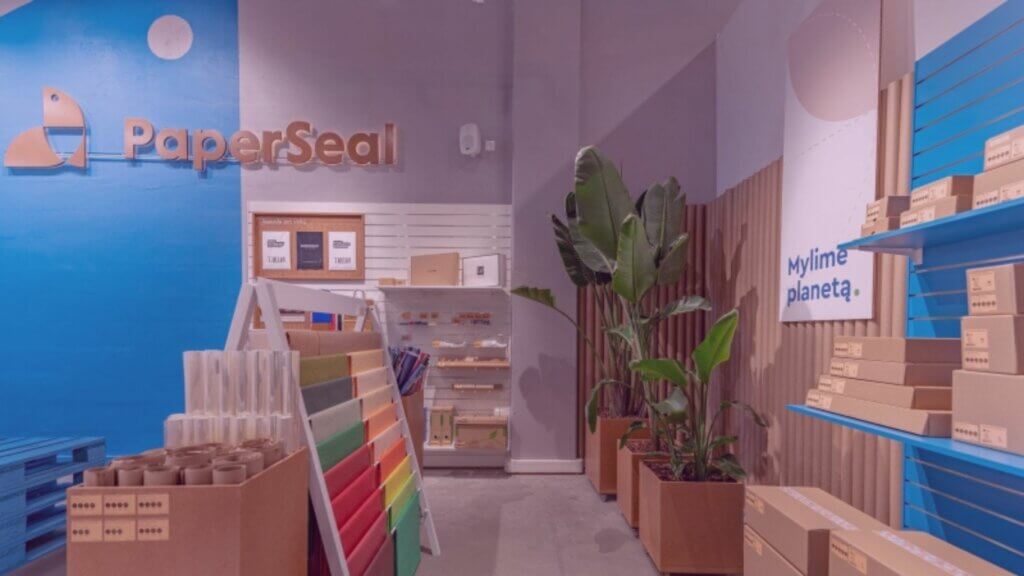Company Name: PaperSeal
Country: Lithuania, Latvia, Estonia
Industry: Packaging and Containers Retail
Company size: 11-50 employees
VentorTech solutions: Odoo Direct Print PRO, Ventor, Odoo consulting
Goal: Implement mobile terminals for all warehouse operations and optimize “Quote to Cash” workflow
“When we look back at how we worked back then as compared to how we work now, the difference exceeds our initial expectation that we were hoping to achieve at the beginning.”
Ignas Dudulevicius, Warehouse Manager at PaperSeal
About the company
PaperSeal is a shipping supply and decorative packaging retail company that offers online and in-store shopping, operating across the Baltic States: Lithuania, Latvia, and Estonia.
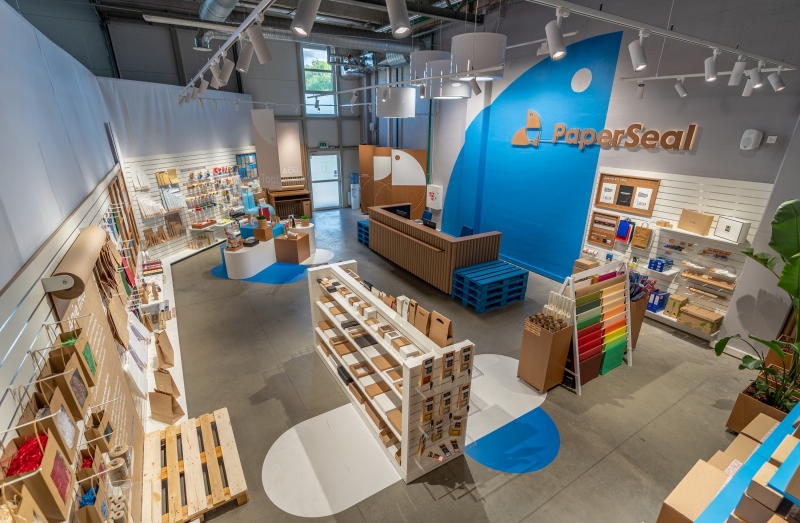
They sell various packaging and finishing materials, such as cardboard boxes, transport boxes, tapes, envelopes, gift boxes, bags, and more.
Business workflow
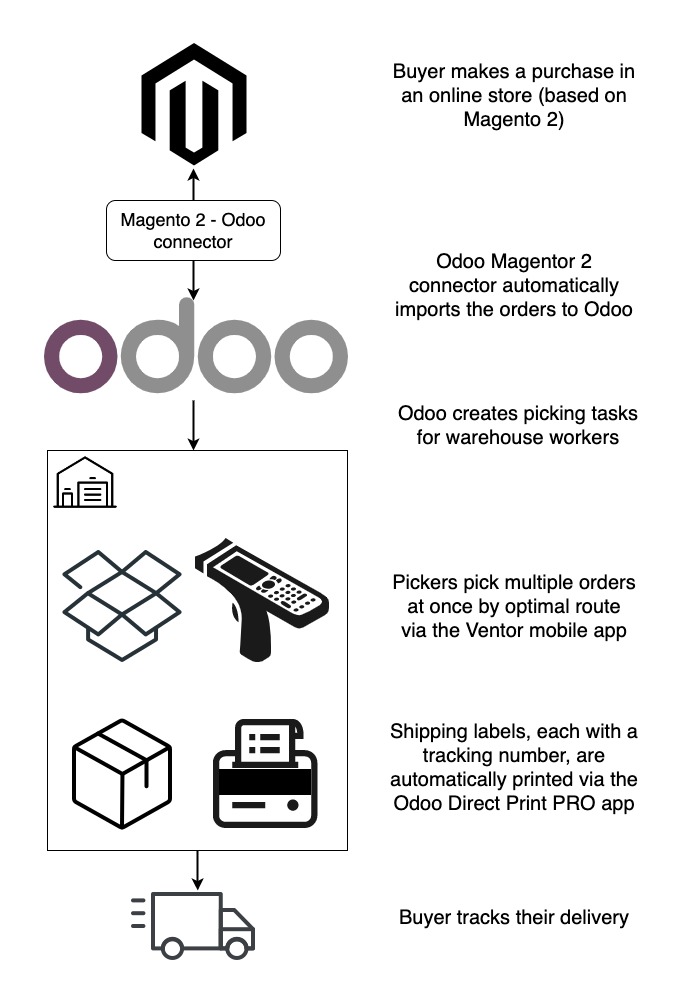
Selling goods offline and online (Magento 2 store on the backend), orders are automatically imported to Odoo ERP via an Odoo Magento 2 connector. Then pickers pick the delivery order items using mobile terminals, pack them, and print shipping labels. After that, obtained tracking numbers are exported to Magento and visible in the buyer’s personal account.
Problems
Working in the market since 2013 and constantly growing, PaperSeal faced a typical bottleneck of business scaling: efficiency in warehouse operations.
“Most of the scaling problems that rose before us were related to the inventory. As the product line and number of orders kept on growing, we had a difficult time keeping track of the product quantities, locations, and order processing speed.”
Ignas Dudulevicius, Warehouse Manager at PaperSeal
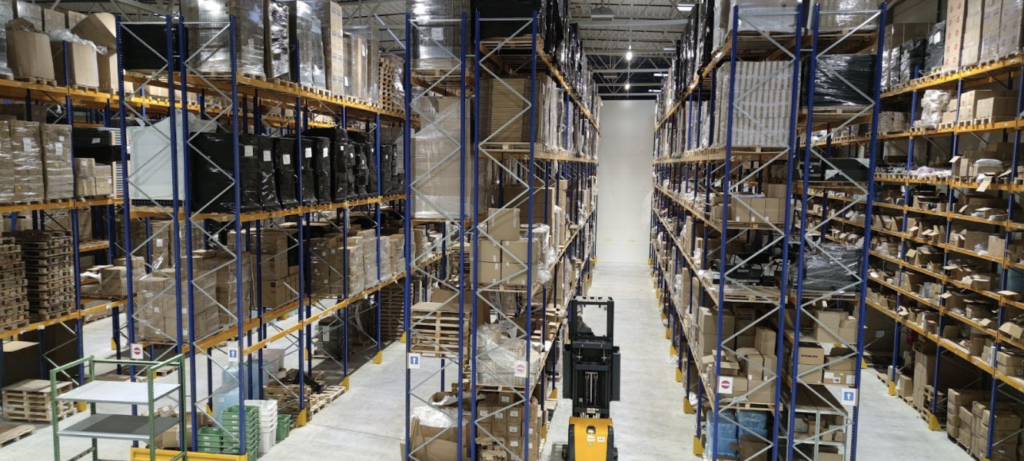
They figured out three main problems:
- Lack of a warehouse management system (WMS)
“We used mobile tablets to open orders on our e-shop and pick directly from it. Using tablets was inconvenient because they were too big to carry around all the time. Also, it was difficult to keep track of who was picking what, especially when we had more pickers. We quickly noticed that with every new worker in the warehouse, we gained less and less efficiency.”
Ignas Dudulevicius, Warehouse Manager at PaperSeal
- Lack of smart picking routes.
Having a warehouse (up to 3000 m2) with 4–9 shelves, pickers often had to return to already visited zones while picking one order, and then again when picking another order, and so on.
- Lack of good Odoo consultants.
Local Odoo partners had no domain expertise in logistics, and this complicated the understanding of specific business processes.
Goals
They were sure from the start that they wanted to use Odoo, since it still had some similarities to their existing OpenERP.
The project manager of PaperSeal asked us to help them to optimize daily inventory operations and boost warehouse efficiency.
He had three main goals to optimize warehouse:
- Integrate mobile terminals for all daily operations.
- Create a warehouse map and optimize picking routes.
- Implement product barcodes via Odoo.
Are you new to Odoo and want to implement it?
Solution
Migration to Odoo
PaperSeal has an onsite Odoo development team, and migration from the old fashioned OpenERP 6 to Odoo v13 had been completed by this team.
About Odoo migration
“We were thinking about Odoo v9 initially, which was not new at the moment, but was easier and cheaper to implement. Also, it was already familiar to our developers. Another choice was Odoo v13, which was just released.”
Ignas Dudulevicius, Warehouse Manager at PaperSeal
Odoo is released every year. Is upgrading complicated?
“We decided to go with Odoo v13 as the change was already massive anyway, it didn’t make sense to upgrade to an older version. As it turns out, we made the right choice, because module and app support for v9 is almost non-existing now, and we would have needed to make an upgrade once more at that point.”
Ignas Dudulevicius, Warehouse Manager at PaperSeal
Looking for a migration from an old-fashioned ERP or from old Odoo versions?
Ventor PRO: Odoo barcode scanner app
The next step was the implementation of mobile terminals and the Ventor app in daily processes. While making Odoo changes, they have been testing Ventor along the way. They had to try different mobile terminal models that are best suited for different Odoo operation types: receipts, internal transfers, order picking, and packing.
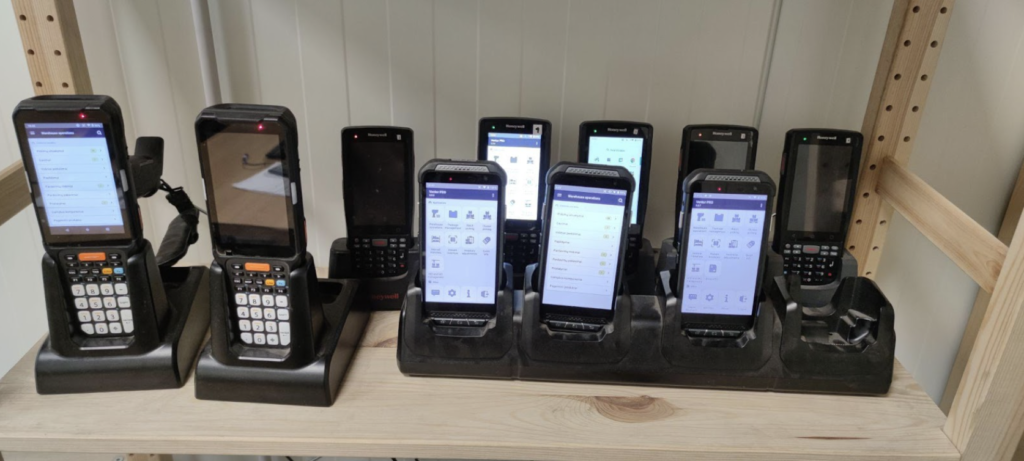
“We like the flexibility of the Ventor app that lets us use it on any Android device. For example, for our pickers, we chose wrist mounted terminals along with finger scanners. It was very important for us that the picker would have both hands free not only for product picking, but for the ability to safely operate the order picker as well.”
Ignas Dudulevicius, Warehouse Manager at PaperSeal
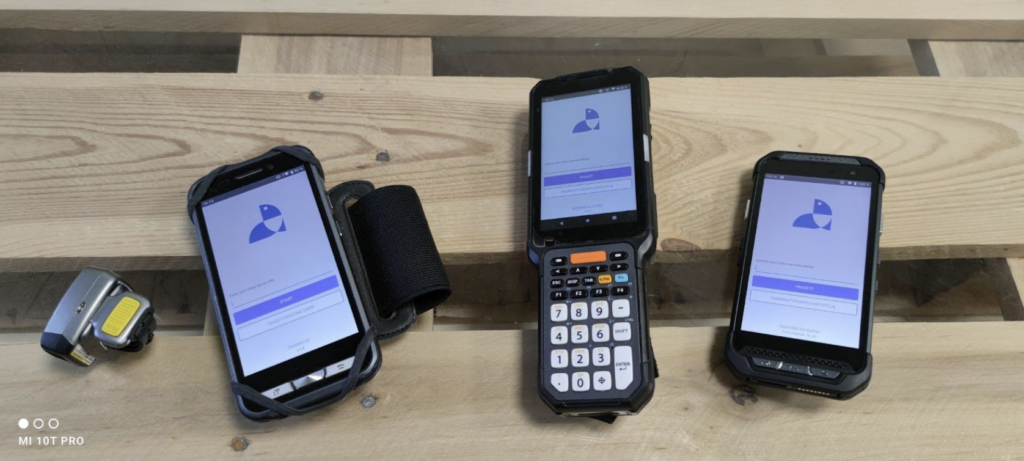
Odoo warehouse map
For all warehouses, all zones and locations were assigned related names and barcodes according to best practices from warehouse experts. All warehouse locations were exported to Odoo.
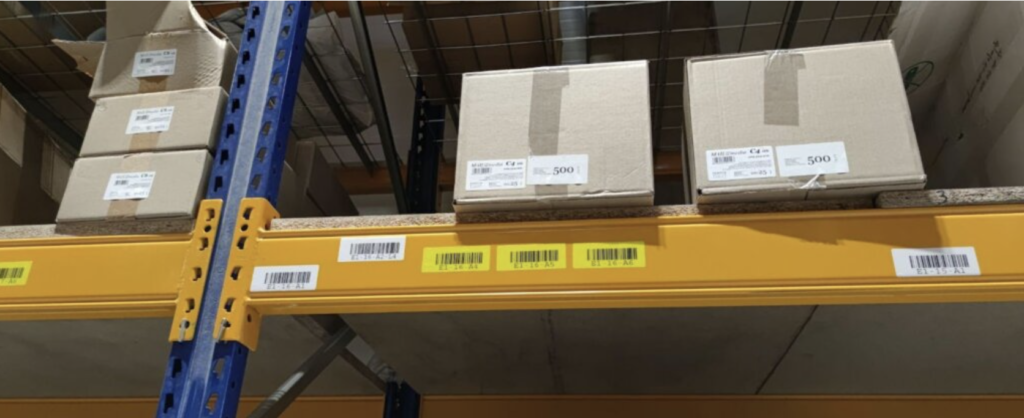
Create and adjust product, location, and many more labels with ZPL Label Designer PRO.
Odoo picking routing optimization
Based on the warehouse map, an optimal picking route was built and implemented in Odoo via the picking and reservation strategy app.
“The Picking and Reservation Strategy module helped us to create the custom picking route that is optimized specifically how we want it”
Ignas Dudulevicius, Warehouse Manager at PaperSeal

Watch how PaperSeal’s warehouse workflows from input to delivery are processed in an optimal route via Ventor PRO
Cluster picking in Odoo
“Cluster Picking lets us pick and sort multiple orders at the same time. Now 4 pickers can easily achieve the same picking speed as 8 pickers used to before.”
Ignas Dudulevicius, Warehouse Manager at PaperSeal
Having many orders daily, PaperSeal uses the cluster picking option in Ventor to pick multiple orders at the same time.
Using cluster picking with Ventor, the customer has the following benefits:
- One picker picks many Odoo orders at once.
- The orders are sorted on the go; no need to spend time on packing.
- Pickers minimize walking time by following optimal routes.
“We use Cluster Picking for orders and sort them into picking boxes. These boxes have assigned names, which really are child locations of the packing zone. On packing, we used to scan a box instead of an operation barcode, and Ventor instantly finds us the related picking assigned to that box.”
Ignas Dudulevicius, Warehouse Manager at PaperSeal
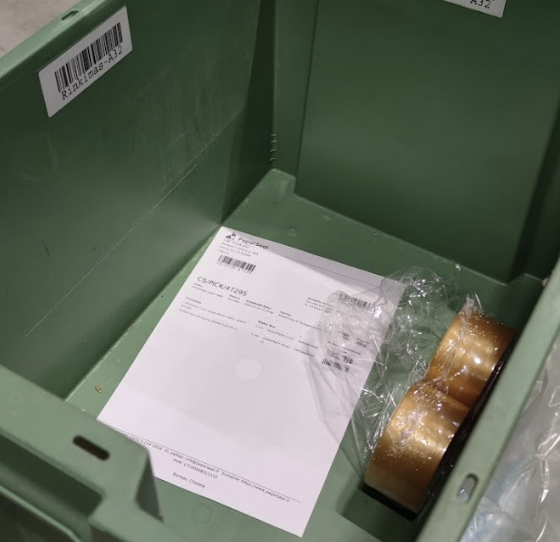
Odoo Direct Print PRO
Instead of downloading from Odoo any PDF report like picking operation or ZPL shipping labels and manually sending them to a related printer, PaperSeal uses the Odoo Direct Print PRO app. Automatic print scenarios allow instant printing of any document from Odoo.
For example, when a packer validates an order in Ventor, they get a printed shipping label from a carrier in seconds.
“Also, we use Odoo Direct Print PRO for easy printing of delivery slips as well as printing Odoo product barcodes directly from the mobile terminal.”
Ignas Dudulevicius, Warehouse Manager at PaperSeal
Odoo product barcodes
The customer never had product barcodes in Odoo. They scanned all product barcodes into Odoo from scratch using the Quick Info menu in Ventor. Some products have more than one barcode, so they use the Product Multiple Barcodes module for those instances.
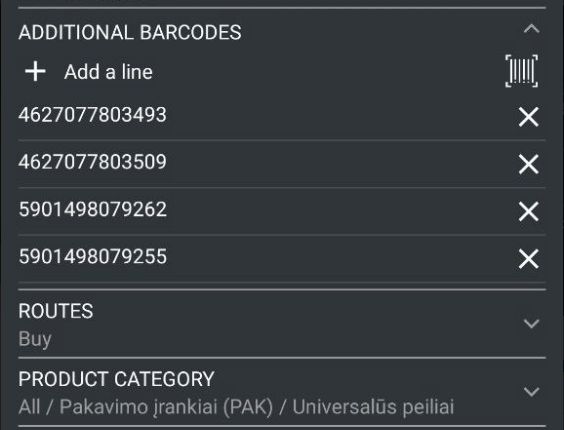
Ventor PRO customizations
It’s not a secret that every business is unique and often requires developing Odoo customizations for a specific customer’s workflow. The same was with the Ventor PRO: Odoo barcode scanning app.
For PaperSeal, we customized the packing workflow in the app and improved access rights settings in the Ventor Base app (Odoo module that extends Ventor’s functionality) to achieve a more flexible and customer-ready solution.
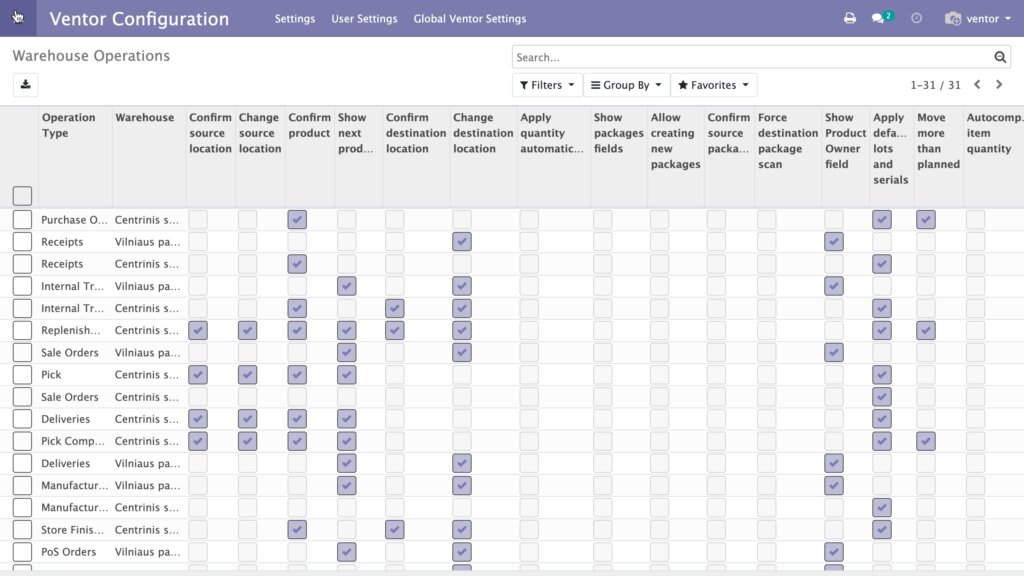
The customer can change Ventor settings from Odoo (e.g., restrict some operations for a particular user, limit locations or warehouses, allow working on inventory adjustments, etc.)
An important point is that Ventor PRO is easy to customize, and moreover, migrating to new Odoo versions is easy. It’s almost impossible to customize the Odoo barcode app (available only for Enterprise users), and entirely impossible to migrate this custom code in the future. With Ventor PRO, you can forget about migration issues.
Odoo consultations
As the customer had an onsite Odoo development team, most of development was implemented by this team. VentorTech, and specifically our CBDO Vitaly Eremeev, was engaged as a consultant for the Odoo warehouse part. Having great expertise in Odoo Inventory, we quickly figured out the core of any constraints and suggested optimal solutions.
The collaboration was a win-win. PaperSeal’s Project Manager Ignas Dudulevicius provided us with much useful feedback regarding Ventor. We improved the serial numbers workflows, batch and cluster picking, the app’s UX along with translating the app into Lithuanian, and much more.
It’s always nice to work with such customers 🙂
Cost and lead time of the Odoo project
Odoo apps from the VentorTech ecosystem
PaperSeal uses the following apps from VentorTech:
- Ventor: Barcode app for Odoo inventory (more than 20 handhelds)
- Odoo Direct Print PRO
- Odoo picking and reservation strategy
- Odoo multiple barcodes
All these apps work out of the box and don’t require implementation services. However, some time was needed for testing, configuration, and adjustments.
“We have spent a lot of time trying and testing different options and variations on how to best optimize our warehouse processes in Odoo. All in all, it took us around 5 months from the beginning stage to the actual day we started to use the mobile terminals.”
Ignas Dudulevicius, Warehouse Manager at PaperSeal
Lead time
4–5 months
Cost
~120 EUR per month (subscription fee)
You can find Ventor pricing here and Odoo Direct Print PRO pricing here.
Odoo implementation
“Initial preparation, module configuration, Odoo training, switching platforms, and making changes after that took us about 6 months.”
“After the start we mostly spent our own time in training, analyzing, and adjusting settings. Now we don’t need to spend anything, except to test new update releases.”
Ignas Dudulevicius, Warehouse Manager at PaperSeal
As mentioned above, the Odoo implementation was done by an onsite team. When we do a similar project, it usually:
- Requires a 0.5–1 Odoo developer 1 BA/PM and 0.5 QA
- Takes 4–6 months. Right after that, a dedicated developer for support and maintenance will be needed.
- Costs $40K–$75K + support
Have you implemented Odoo and failed with another partner?
Results
PaperSeal boosted the efficiency of their warehouses. All daily operations were optimized using barcode scanners and printers connected to Odoo.
Receiving goods and creating serial numbers for new quants, internal transfers to warehouse locations and offline stores, inventory adjustments, picking by fastest route, packing with instant printing of shipping labels retrieved from carriers – now all this allows processing 2 times more orders per day with the same staff.
- All that let us improve our order processing effectiveness by 100%.
- We reduced our costs significantly.
- We reduced our margin of error by 5x and improved customer satisfaction overall.
- We have been using the Ventor app for 18 months now for every transfer in our warehouse.
Of course, it didn’t all happen in one day. Odoo optimization is a never ending process, and we continue to update our system and implement the newest features of the apps. Some of them are big. Some of them are small, but still, if you make ten small improvements, it adds up.
Ignas Dudulevicius, Warehouse Manager at PaperSeal
Looking for a reliable Odoo partner?
If you have some questions, feel free to ask them in the comments section below. Also, subscribe to our YouTube channel and follow our company on LinkedIn not to miss useful content.
